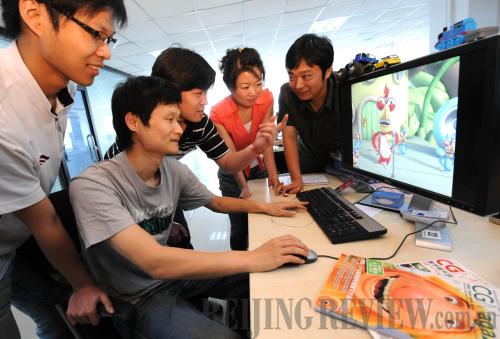|
Forces behind change
 |
|
CREATIVE THINKING: Animation graphic designers at work in an industry base in Tianjin on May 13, 2009 (LIU HAIFENG) | Different factors have given rise to new occupations, said Cai Xiaowu, a professor with the Finance Department of Zhejiang University. These factors include China's social transformation, economic transition, rapid economic growth, industrial structural adjustment, increasingly tight job markets and the diversification of personal needs.
For example, driving instructors have thrived with the development of the automobile industry in China. China used to be a country dominated by bicycle transportation. As people have become wealthier, however, more and more of them own cars and enroll in driving schools, so that driving instruction become a lucrative profession.
Government statistics show that as of the end of 2008, the number of driving instructors exceeded 260,000, and is growing at an annual rate of 10 percent. At the same time, the number of vehicle drivers exceeded180 million, of which 122 million drive cars.
Social changes contribute to the birth and demise of occupations, said Zhou, noting there is greater job mobility now than before. Under a planned economy, individuals could not make their own career choices. People were assigned lifetime employment and seldom changed their jobs, while in the market economy of today, individuals can choose jobs, hop between jobs and manage their own careers.
But the freedom to choose one's own job does not mean that one can get whatever job one wants, said Zhou, as organizations also have the right to recruit those people who satisfy their criteria, with regard to areas such as education levels, professional competence, health and personality traits.
While there were no such things as layoffs and unemployment under a planned economy, jobs are no longer as secure in a market economy, said Zhou. For example, white-collar workers can be fired and overseas returnees may have difficulty securing jobs.
Permanent positions provided by employers are dwindling, while more jobs are independent of any organizations. Zhou said a significant portion of duties traditionally performed by permanent employees are now carried out by temporary workers or outsourced to external experts and freelancers.
Zhou said the way people acquire jobs has also changed. Now, people more frequently obtain jobs through their personal qualifications such as knowledge, skills, attitude and values, rather than through family ties or social background.
People's standards for career success have changed, too. Traditionally, people climbed up a social pyramid, striving for higher positions or increased wealth. Today the younger generation values psychological satisfaction more, and has a desire for interesting and flexible jobs.
It is obvious that the new occupations have taken on "distinct characteristics of the market economy," said Cai.
New rules
New occupations have a significant impact on China's economy. An array of services usually develops around a new occupation, such as certification, training and employment services, said Cai.
In response to the emerging new occupations, vocational schools and universities have set up relevant majors to meet training needs. For example, Tianjin University offers animation graphic design programs, and graduates of the program can seek employment with television stations, advertising companies and computer game producers.
Professional standards have been established for many of these new occupations. For example, financial planners are required to possess at least two years of college education, four years of professional experience and pass relevant examinations. Financial planners must possess adequate knowledge of economics, insurance, investment, taxation, accounting and relevant laws and regulations.
Image designers, whose job is to boost people's image by advising them on clothing, body shaping, makeup and etiquette, are required to receive at least 240 hours of full-time vocational training and obtain a registered professional qualification certificate from the China Image Designers Association.
The government needs to establish more professional standards, standardize evaluation methods, and strengthen management of the training market, said Zhou. |
